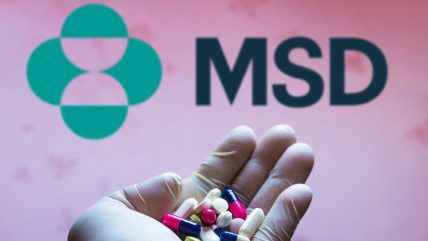
MSD has reported its FY 2023 financial results, revealing a 1% increase in revenues of $60.1bn from $59.3bn reported in 2022.
The company saw an increase in sales for its top-selling cancer drug Keytruda (pembrolizumab), but sales of the company’s antiviral Covid-19 drug Lagevrio (molnupiravir) declined by 75% to $1.4bn, in 2023.

Discover B2B Marketing That Performs
Combine business intelligence and editorial excellence to reach engaged professionals across 36 leading media platforms.
The high 2022 revenues were driven at a time when the threat of the Covid-19 pandemic was still significant. However, as the demand for Covid-19 treatments diminishes, companies are seeing revenue decreases in vaccines and treatments, with Pfizer reporting a 42% revenue drop for FY 2023 in comparison to 2022. While Merck & Co was relatively buffeted by the diminishing Covid-19 treatment revenues, the impending patent expiry for its blockbuster drug may be challenging in a few years.
The PD-1 inhibitor Keytruda, which is approved to treat 17 tumour types and other cancers based on the presence of certain genetic alterations, generated $25bn sales in 2023, a 19% increase compared to $20.9bn in 2022.
Despite Keytruda’s success, sales are forecast to drop as its patent runs out in 2028, opening up an opportunity for an influx of biosimilars. According to an analyst consensus forecast on GlobalData’s Pharma Intelligence Center, Keytruda sales are forecasted at $27.4bn in 2029, a decrease of 19% from $33.7bn in 2028 estimates.
GlobalData is the parent company of Pharmaceutical Technology.

US Tariffs are shifting - will you react or anticipate?
Don’t let policy changes catch you off guard. Stay proactive with real-time data and expert analysis.
By GlobalDataLooking forward to 2024, MSD expects overall worldwide sales to be between $62.7bn and $64.2bn.
The company is strengthening its immunotherapy portfolio by building a pipeline of early-stage assets. Earlier this year, the company entered a definitive agreement to acquire US-based Harpoon Therapeutics for $680m. Under the terms of the deal, Merck will acquire Harpoon’s T-cell engagers – engineered antibodies that redirect T cells to attack cancer cells. The deal is expected to close in H1 2024.
The company also noted in the announcement lower sales of its anti-diabetic agent Januvia (sitagliptin), citing competition from generics in ex-US markets and lower demand in the US. Januvia is also one of the ten drugs that will be subject to price negotiations with the Centers for Medicare and Medicaid Services (CMS) under the Inflation Reduction Act (IRA) in the US.
Januvia was identified as one of the 48 drugs, that are reimbursed under Medicare Part B, that raised prices at a rate faster than inflation. Januvia generated $2.2bn sales in 2023, compared to $2.8bn in 2022.
In the announcement accompanying the full year results, CEO of MSD Robert Davis said: “We reached more than 500 million people with our medicines last year alone, over half of which were donations, including through our program to treat river blindness.
“We also made investments of approximately $30 billion in research and development in our ongoing effort to discover, develop and collaborate to propel the next generation of impactful innovations.”




